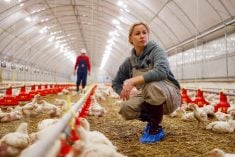The United States Houses of Representatives voted 300-131 on June 10 in favour of ending mandatory country of origin labels on imported beef and pork.
The next hurdle is the U.S. Senate where some politicians are resisting change even though the World Trade Organization has ruled against COOL four times saying it discriminates against Canadian and Mexican beef and pork.
“Getting it through the House was probably the easy part. We are going to have a bigger, uphill battle with the Senate,” said John Masswohl of the Canadian Cattlemen’s Association.
Read Also

B.C. ostriches culled, CFIA confirms
Ostriches on an embattled Edgewood, B.C. farm have been culled after a prolonged legal battle, the Canadian Food Inspection Agency has confirmed.
Senator Pat Roberts, who chairs the Senate agriculture committee, agrees labelling meat products with the country of origin was bad policy. However, when it comes to repealing laws, the Senate requires unanimous consent.
If any senator says no, 60 votes are required to pass the bill. It also works that way in committees. A committee requires 11 votes.
“I don’t think we have 11 in the committee and I don’t think we have 60 in the full Senate,” he said.
On June 17, Canada can ask for permission to retaliate at a special meeting of the WTO dispute settlement body. The WTO appoints arbitrators and issues a schedule for a hearing so authorization to impose tariffs could come in late summer.
Timing may be everything because the Senate adjourns at the end of July.
“If the authorization comes while the Senate and the Congress are not sitting that would be an unfortunate scenario for them. I would think they would want to repeal it before the end of July,” he said.
U.S. COOL laws brought huge added costs to the Canadian beef and pork sectors, because it forced U.S. packers to process animals and carcasses from foreign countries on separate production lines so they could be properly labelled as originating from outside the U.S. That led to U.S. packers refusing Canadian product due to the added costs, which cost Canadian producers billions in lost markets.















